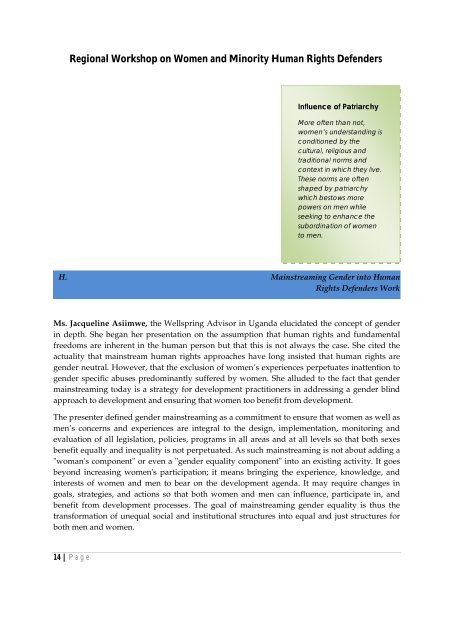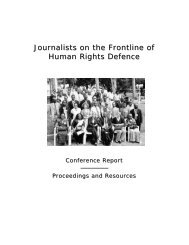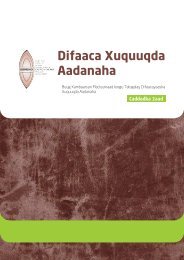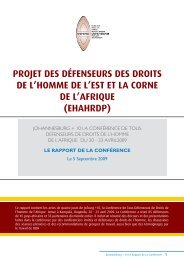Table of Contents - East and Horn of Africa Human Rights ...
Table of Contents - East and Horn of Africa Human Rights ...
Table of Contents - East and Horn of Africa Human Rights ...
Create successful ePaper yourself
Turn your PDF publications into a flip-book with our unique Google optimized e-Paper software.
Regional Workshop on Women <strong>and</strong> Minority <strong>Human</strong> <strong>Rights</strong> Defenders<br />
H. Mainstreaming Gender into <strong>Human</strong><br />
<strong>Rights</strong> Defenders Work<br />
Ms. Jacqueline Asiimwe, the Wellspring Advisor in Ug<strong>and</strong>a elucidated the concept <strong>of</strong> gender<br />
in depth. She began her presentation on the assumption that human rights <strong>and</strong> fundamental<br />
freedoms are inherent in the human person but that this is not always the case. She cited the<br />
actuality that mainstream human rights approaches have long insisted that human rights are<br />
gender neutral. However, that the exclusion <strong>of</strong> women’s experiences perpetuates inattention to<br />
gender specific abuses predominantly suffered by women. She alluded to the fact that gender<br />
mainstreaming today is a strategy for development practitioners in addressing a gender blind<br />
approach to development <strong>and</strong> ensuring that women too benefit from development.<br />
The presenter defined gender mainstreaming as a commitment to ensure that women as well as<br />
men’s concerns <strong>and</strong> experiences are integral to the design, implementation, monitoring <strong>and</strong><br />
evaluation <strong>of</strong> all legislation, policies, programs in all areas <strong>and</strong> at all levels so that both sexes<br />
benefit equally <strong>and</strong> inequality is not perpetuated. As such mainstreaming is not about adding a<br />
"woman's component" or even a "gender equality component" into an existing activity. It goes<br />
beyond increasing women's participation; it means bringing the experience, knowledge, <strong>and</strong><br />
interests <strong>of</strong> women <strong>and</strong> men to bear on the development agenda. It may require changes in<br />
goals, strategies, <strong>and</strong> actions so that both women <strong>and</strong> men can influence, participate in, <strong>and</strong><br />
benefit from development processes. The goal <strong>of</strong> mainstreaming gender equality is thus the<br />
transformation <strong>of</strong> unequal social <strong>and</strong> institutional structures into equal <strong>and</strong> just structures for<br />
both men <strong>and</strong> women.<br />
14 | P a g e<br />
Influence <strong>of</strong> Patriarchy<br />
More <strong>of</strong>ten than not,<br />
women’s underst<strong>and</strong>ing is<br />
conditioned by the<br />
cultural, religious <strong>and</strong><br />
traditional norms <strong>and</strong><br />
context in which they live.<br />
These norms are <strong>of</strong>ten<br />
shaped by patriarchy<br />
which bestows more<br />
powers on men while<br />
seeking to enhance the<br />
subordination <strong>of</strong> women<br />
to men.








